Spartacus Review
Industrial Revolution
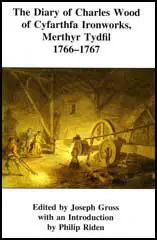
Title: The Diary of Charles Wood
Author: Joseph Gross
Editor:
Publisher: Merton Priory Press
Price: £24.95
Bookshop: Amazon
Spartacus Website: Merthyr Tydfil
Category:
Charles Wood (1702–74), a member of a family long connected with the iron industry of the West Midlands and later Cumberland, spent the last decade of his life at Merthyr Tydfil in Glamorgan, first supervising the construction of Cyfarthfa Ironworks and then acting as manager on behalf of owners who lived elsewhere. For about twelve months in 1766–7, while the furnace, forge and other plant were being built, Wood kept a daily record of the progress of the work, which provides a unique insight into the difficulties of such an undertaking in a remote part of the country. The book in which he wrote the diary was used in the 1750s to note Wood's experiments at Low Mill in Cumberland when he was attempting to perfect what became known as the 'potting' or 'potting and stamping' process of refining pig iron into bar iron, and also to record a tour he made of ironworks in various parts of England in 1754.

Title: Rhondda Coal, Cardiff Gold
Author: Richard Watson
Editor:
Publisher: Merton Priory Press
Price: £14.95
Bookshop: Amazon
Spartacus Website: Welsh History Websites
Category:
Tracing the rise and decline of a leading coal-owning family from their origins as Worcester timber merchants who moved to the new docks at Cardiff, through their acquisition of collieries in the Rhondda and involvement with the Taff Vale and other railways. Commercial success enabled the family to buy the Insole Court estate at Llandaff and another in Somerset. After the First World War, the family's fortunes stumbled with those of the South Wales coal industry generally, their businesses became part of the Powell Duffryn Combine, and their estates were sold.
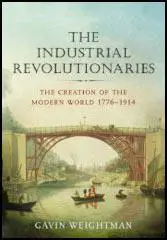
Title: Industrial Revolutionaries
Author: Gavin Weightman
Editor:
Publisher: Atlantic Books
Price: £20.00
Bookshop: Amazon
Spartacus Website: Industrial Revolution
Category:
The so-called "industrial revolution" is most commonly presented as a history of machines or a relentless process of innovation that sprang from a new kind of scientific thought forged in the eighteenth century. But, as it emerges in Gavin Weightman's engrossing social history, machines are mere gadgets unless there are people to make good use of them. "The Industrial Revolutionaries" interweaves accounts of the achievements of giants such as Trevithick, Stevenson, Watt, wedgwood, Daimler, Bessemer and Edison with lesser-known characters who carried industrialism from one nation to another.
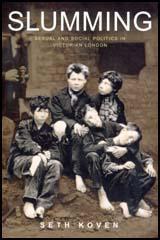
Title: Slumming
Author: Seth Koven
Editor:
Publisher: Princeton University Press
Price: £11.95
Bookshop: Amazon
Spartacus Website: Poverty
Category:
In the 1880s, fashionable Londoners left their elegant homes and clubs in Mayfair and Belgravia and crowded into omnibuses bound for midnight tours of the slums of East London. A new word burst into popular usage to describe these descents into the precincts of poverty to see how the poor lived: slumming. In this captivating book, Seth Koven paints a vivid portrait of the practitioners of slumming and their world: who they were, why they went, what they claimed to have found, how it changed them, and how slumming, in turn, powerfully shaped both Victorian and twentieth-century understandings of poverty and social welfare, gender relations, and sexuality. The slums of late-Victorian London became synonymous with all that was wrong with industrial capitalist society. But for philanthropic men and women eager to free themselves from the starched conventions of bourgeois respectability and domesticity, slums were also places of personal liberation and experimentation. Slumming allowed them to act on their irresistible "attraction of repulsion" for the poor and permitted them, with society's approval, to get dirty and express their own "dirty" desires for intimacy with slum dwellers and, sometimes, with one another. "Slumming" elucidates the histories of a wide range of preoccupations about poverty and urban life, altruism and sexuality that remain central in Anglo-American culture, including the ethics of undercover investigative reporting, the connections between cross-class sympathy and same-sex desire, and the intermingling of the wish to rescue the poor with the impulse to eroticize and sexually exploit them. By revealing the extent to which politics and erotics, social and sexual categories overflowed their boundaries and transformed one another, Koven recaptures the ethical dilemmas that men and women confronted - and continue to confront - in trying to "love thy neighbor as thyself."
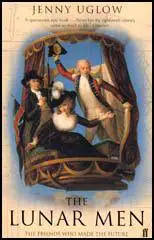
Title: The Lunar Men
Author: Jenny Uglow
Editor:
Publisher: Faber & Faber
Price: £9.99
Bookshop: Amazon
Spartacus Website: James Watt
Category:
Led by Erasmus Darwin (grandfather of Charles Darwin), the Lunar Society of Birmingham were a group of eighteenth-century amateur experimenters who met monthly on the Monday night nearest to the full moon. Echoing to the thud of pistons and the wheeze of snorting engines, Jenny Uglow's vivid and swarming group portrait brings to life the inventors, artisans and tycoons who shaped and fired the modern world. The group included James Watt; Josiah Wedgewood; Joseph Priestley and Matthew Boulton.
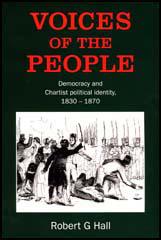
Title: Voices of the People
Author: Robert G. Hall
Editor:
Publisher: Merlin Press
Price: £15.95
Bookshop: Amazon
Spartacus Website: 0
Category:
An examination of Chartist democracy viewed 'from below' Considers which groups were more and less vocal in the movement, how political identity intertwined with craft, ethnicity, gender and class. Questions myths, memories, and identities and will appeal to students of history, sociology and culture challenges the approach of Gareth Stedman-Jones, Patrick Joyce and James Vernon This study explores the development and decline of Chartism as a coherent political identity between 1830 and 1860 and illustrates the creation of Chartist identity from the perspective of plebeian intellectuals and activists in Ashton-under-Lyne and other militant localities of Greater Manchester and Lancashire.
